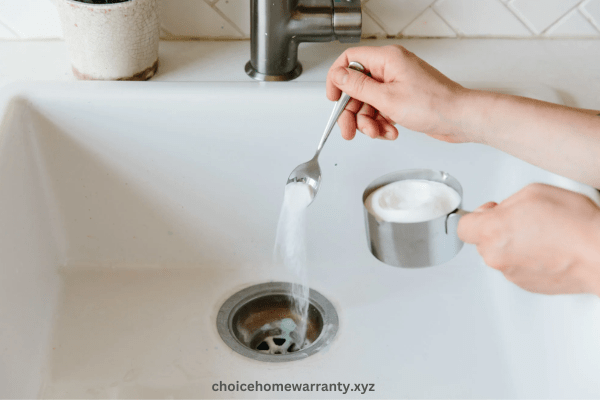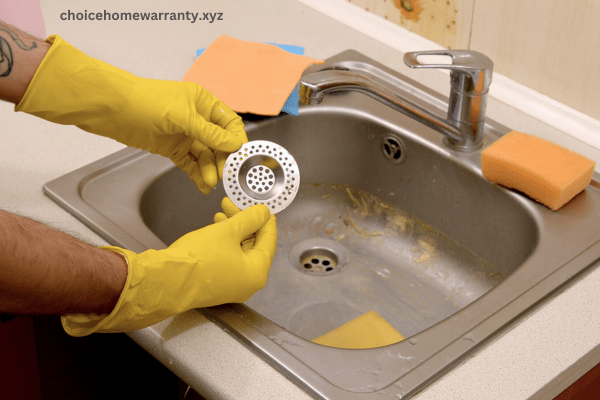The foul odor emanating from your kitchen sink drain can truly be a buzzkill in any home. It disrupts the tranquility of the space and makes the thought of washing dishes unbearable. While it’s easy to blame leftover food scraps and grime for the stench, there might be a more sinister culprit at play. Accumulated bacteria and mold in the pipes could be causing this putrid smell, creating a breeding ground for all things smelly within your drainage system. Get rid of that bad smell from the kitchen sink drain with our proven tips and solutions.
Unbeknownst to many, pouring hot water down the sink can sometimes exacerbate the problem rather than alleviate it. The heat can release trapped odors from decomposing matter in the pipe, further adding to your olfactory distress. Instead of resorting to quick fixes that only provide temporary relief, it might be time to take a more proactive approach by using natural remedies like baking soda and vinegar to neutralize the foul scent at its source.
Addressing bad smells from kitchen sink drains requires understanding the underlying causes and taking preventive measures to ensure they don’t return. By tackling this issue head-on with informed solutions, you can once again reclaim your kitchen as an inviting space free from unpleasant odors.
Causes of Bad Smell
1. Decomposing Food Particles
The bad smell coming from a kitchen sink drain can often be attributed to decomposing food particles. When leftovers are washed down the drain, they can accumulate and decompose, creating an ideal environment for unpleasant odors to develop. As these food particles break down, they release foul-smelling compounds that cause the sink to emit a malodorous scent. It’s important to regularly clean out the drain and dispose of food waste properly to prevent this issue.
2. Grease Buildup
The bad smell emanating from the kitchen sink drain can often be attributed to the accumulation of grease in the pipes. As grease traps food particles, it creates an ideal environment for bacteria to thrive and multiply, leading to a foul odor. The buildup of grease in the pipes not only causes blockages but also contributes to the unpleasant smell that can permeate throughout the kitchen and surrounding areas. Therefore, regular cleaning and maintenance of the kitchen sink drain are essential in preventing grease buildup and eliminating the associated bad smell.
3. Bacterial Growth
The bad smell emanating from your kitchen sink drain can often be attributed to the causes of bacterial growth. Bacteria thrive in damp environments, and the dark recesses of your drain provide the ideal conditions for them to multiply. As a result, the accumulation of bacteria contributes to the unpleasant odor that you may notice. It’s important to address this issue by thoroughly cleaning and disinfecting your drain to inhibit bacterial growth and eliminate the bad smell. Regular maintenance and cleaning can help prevent this problem from recurring in the future.
4. Mold and Mildew Accumulation
The accumulation of mold and mildew in the kitchen sink drain can lead to a persistent and unpleasant musty odor. These fungi thrive in moist environments, such as drains, and their presence poses both health risks and olfactory discomfort. The combination of organic matter and moisture creates an ideal habitat for mold and mildew growth, leading to a foul smell emanating from the kitchen sink drain. Regular cleaning and maintenance are essential to prevent the buildup of these microorganisms and eliminate the bad smell from the drain.
Importance of Addressing the Issue
Dealing with a bad smell coming from your kitchen sink drain is not just about discomfort, it’s a sign of potential underlying issues that need to be addressed. Ignoring the unpleasant odor can lead to more serious problems such as clogged drains, mold growth, and even health hazards. The foul smell can be caused by food particles, grease buildup, or sewer gases seeping back up through the pipes.
Addressing this issue promptly is crucial to maintaining a clean and healthy living environment. Moreover, the bad odor from the kitchen sink drain can affect the overall ambiance of your home and create an unwelcoming atmosphere for you and your guests. It’s also important to recognize that constant exposure to unpleasant smells can have negative effects on mental well-being and overall mood.
By resolving this issue, you not only improve the functionality of your kitchen but also contribute to a more pleasant and inviting home environment for all who enter. Taking proactive steps to eliminate the bad smell from your kitchen sink drain is an essential part of maintaining a hygienic and enjoyable living space for yourself and those around you.
DIY Methods to Eliminate Bad Smell
1. Boiling Water and Vinegar Solution
One of the most effective DIY methods to eliminate bad smells from a kitchen sink drain is to use a boiling water and vinegar solution. This simple yet powerful method involves pouring a mixture of boiling water and vinegar down the drain, which helps to break down grease and eliminate odor. The heat from the boiling water helps to dislodge any trapped particles, while the vinegar acts as a natural deodorizer. This is an easy and affordable way to keep your kitchen smelling fresh and clean.
2. Baking Soda and Lemon Remedy
One effective DIY method to eliminate bad smell from kitchen sink drain is to use a combination of baking soda and lemon. This natural cleaning solution can help tackle lingering odors and leave the drain smelling fresh.
To create this remedy, simply mix baking soda with freshly squeezed lemon juice, creating a paste-like consistency. Then, pour the mixture down the drain, allowing it to sit for a while before flushing it with hot water. The result is a refreshing scent that helps combat any unpleasant odors emanating from the kitchen sink drain.
3. Use of Commercial Drain Cleaners
One effective DIY method to eliminate a bad smell from kitchen sink drains is to use commercial drain cleaners. These cleaners can effectively break down organic matter and clear clogs, leaving the drain smelling fresh. However, it’s important to use them sparingly to avoid potential damage to the pipes.
Commercial drain cleaners should be used as a last resort after trying other methods, such as using baking soda and vinegar or a plunger, to eliminate the bad odor. Overall, while commercial drain cleaners can be effective, it’s important to exercise caution when using them to prevent any potential harm to the plumbing system.
4. Cleaning the Drain Trap
One effective DIY method to eliminate bad smells from a kitchen sink drain is to clean the drain trap. By removing and cleaning the drain trap, you can get rid of accumulated debris and prevent unpleasant odors from developing. This simple task can yield significant results in improving the overall scent of your kitchen. By regularly maintaining and cleaning the drain trap, you can ensure that your kitchen sink remains free from bad smells.

Preventive Measures
1. Regular Cleaning Routine
To prevent the bad smell from the kitchen sink drain, it is important to establish a regular cleaning routine. This can include flushing the drain with hot water and vinegar to remove any buildup of food particles and grease. Additionally, using a bacterial drain cleaner can help break down organic matter that may be causing the unpleasant odor.
It is also important to avoid pouring grease or oils down the drain, as these can solidify and contribute to clogs and odors. Ensuring that food scraps are properly disposed of and not allowed to accumulate in the drain will also help prevent unpleasant smells from developing.
2. Proper Disposal of Food Scraps
To prevent bad smells from the kitchen sink drain, it is important to take preventive measures and properly dispose of food scraps. This can be achieved by using a sink strainer to catch food particles and regularly cleaning the drain with a mixture of baking soda and vinegar.
Additionally, avoiding pouring grease or oil down the drain can also help prevent unpleasant odors. Proper disposal of food scraps involves composting organic waste or disposing of it in sealed containers to prevent decomposition in the sink, which can lead to foul odors. These simple preventive measures can help maintain a fresh-smelling kitchen and reduce the occurrence of bad smells emanating from the sink drain.
3. Avoiding Grease Buildup
To avoid the bad smell from the kitchen sink drain, it is crucial to implement preventive measures such as regularly cleaning and avoiding grease buildup. Grease can accumulate in the drain and lead to foul odors, so it is important to dispose of cooking oil and grease properly instead of pouring it down the sink.
Additionally, using hot water and a mixture of baking soda and vinegar can help break down grease and eliminate odor-causing bacteria. By taking these preventive measures and being mindful of what goes down the drain, it’s possible to keep the kitchen sink smelling fresh and clean.
When to Seek Professional Help
If you’ve tried all the DIY methods to get rid of the bad smell coming from your kitchen sink drain and it persists, it’s time to seek professional help. Persistent odors may indicate a more significant plumbing issue that needs expert attention. Signs such as slow drainage, gurgling sounds, or sewage backup could point to a larger problem that requires professional intervention. Don’t hesitate to call in the experts to address the issue before it escalates into a major plumbing disaster.
Professional Plumbing Solutions
1. Drain Snaking
Professional Plumbing Solutions offers effective drain snaking services to address bad smells emanating from kitchen sink drains. Our experienced plumbers use drain snakes to break up and remove clogs deep within the pipes, effectively eliminating the source of the odor. This method is highly effective for stubborn blockages that may be causing unpleasant smells in your kitchen. Trust our team to provide reliable and efficient solutions for all your plumbing needs.
2. Hydro-Jetting
Professional Plumbing Solutions offers top-notch hydro-jetting services to tackle stubborn clogs and odors in your pipes. Our high-pressure water cleaning method ensures the thorough elimination of debris and buildup, leaving your pipes clean and odor-free.
If you’re experiencing a bad smell coming from your kitchen sink drain, our hydro-jetting service is the perfect solution to restore freshness and efficiency to your plumbing system. Trust our expert team to deliver effective and professional plumbing solutions for all your hydro-jetting needs.
3. Pipe Inspection and Repair
Professional Plumbing Solutions offers comprehensive pipe inspection and repair services to address persistent smells emanating from kitchen sink drains. Our team conducts thorough inspections to identify any underlying issues in the pipes that may be causing the unpleasant odor. By repairing or replacing damaged pipes, we can effectively eliminate the source of the smell, ensuring a fresh and clean environment for our clients. With our expertise in pipe inspection and repair, we are dedicated to providing reliable solutions for all your plumbing needs.
Maintenance Tips
1. Regularly Flush with Hot Water
To prevent the bad smell from the kitchen sink drain, it is important to follow some maintenance tips. Regularly flushing the drain with hot water can help prevent odor by keeping the pipes clear and minimizing the chances of bacterial growth. This simple practice can go a long way in maintaining a fresh-smelling kitchen sink and ensuring proper drainage. By making it a habit to flush the drain with hot water regularly, you can effectively address any potential issues related to odor and bacterial buildup.
2. Periodic Use of Natural Cleaners
To keep the kitchen sink drain free from bad odors, it is important to use natural cleaners periodically. Natural cleaners such as baking soda and vinegar can effectively break down organic matter and eliminate any foul smells. By regularly using these natural cleaners, you can prevent the buildup of residue and bacteria that cause unpleasant odors in the kitchen sink drain.
Additionally, flushing the drain with hot water after using natural cleaners can help to further remove any lingering odor-causing substances. With consistent maintenance and the use of natural cleaning methods, you can ensure that your kitchen sink drain remains fresh and odor-free.
3. Annual Professional Plumbing Inspection
It is important to schedule an annual professional plumbing inspection to ensure that all plumbing systems are in good condition and functioning properly. This can help identify potential issues before they become major problems, saving time and money in the long run.
Additionally, if there is a bad smell coming from the kitchen sink drain, it could be indicative of a larger issue such as a clog or buildup of organic matter. It’s important to address this promptly by cleaning the drain and checking for any underlying problems to prevent further issues. Regular maintenance and prompt attention to any unusual odors can help keep the plumbing system running smoothly.
Upgrading Kitchen Plumbing
Consider upgrading your kitchen plumbing with modern drain solutions that minimize the risk of odor and clogs. Explore smart technology options that help monitor and maintain the health of your plumbing system, ensuring a fresh-smelling kitchen.
With smart technology integration, you can stay ahead of any potential issues and enjoy a more efficient and pleasant cooking environment. Say goodbye to bad smells emanating from the kitchen sink drain, as these upgrades can provide a long-term solution to keep your kitchen smelling clean and inviting.
Common Misconceptions
Many people have the misconception that using bleach to mask the smell coming from the kitchen sink drain is an effective solution. However, while bleach may temporarily cover up the odor, it does not address the root cause of the problem. It’s crucial to tackle the source of the smell to find a long-term solution. Ignoring the bad smell from the kitchen sink drain can lead to more significant problems down the line, so addressing it promptly is essential for maintaining a clean and hygienic kitchen environment.
Impact of Bad Smell on Daily Life
The impact of a bad smell from the kitchen sink drain can have a significant effect on daily life. The unpleasant odor can permeate throughout the house, making it uncomfortable for residents and visitors alike. It can also affect the enjoyment of meals and gatherings in the kitchen, as the smell may linger and detract from the overall experience.
Additionally, the bad smell can create a sense of uncleanliness and discomfort, leading to frustration and dissatisfaction with the living environment. Addressing the issue promptly is essential to restoring a pleasant atmosphere and ensuring that daily activities are not disrupted by the lingering odor.

Eco-Friendly Approaches
One eco-friendly approach to dealing with the bad smell from a kitchen sink drain is to use natural cleaning solutions such as baking soda and vinegar. These ingredients can help break down organic matter and eliminate the odor without harsh chemicals.
Additionally, regularly flushing the drain with hot water can help prevent buildup and reduce unpleasant smells. Implementing these eco-friendly approaches not only addresses the problem at hand but also contributes to a healthier environment by reducing the use of harmful cleaning products.
Upgrading Kitchen Plumbing
If you’re experiencing a foul smell coming from your kitchen sink drain, it may be time to consider upgrading your kitchen plumbing. The bad odor could be a sign of a clog or buildup in the pipes, which can lead to bacterial growth and unpleasant smells.
Upgrading the plumbing system can help improve drainage and prevent future issues, ensuring that water and waste are properly removed from the sink. Additionally, modernizing the plumbing can also help eliminate any potential sources of bad odor, creating a more hygienic and pleasant kitchen environment for you and your family.
Conclusion
Dealing with a can be an unpleasant and frustrating experience for many homeowners. However, by identifying the root cause of the odor and taking proactive steps to address it, such as regular cleaning and using natural remedies, it is possible to eliminate the problem.
Additionally, maintaining good kitchen sink hygiene practices and avoiding disposing of food waste down the drain can help prevent future odors from developing. Overall, addressing the issue of a bad smell from the kitchen sink drain requires patience, persistence, and a commitment to proper maintenance. By implementing these strategies, homeowners can enjoy a fresh-smelling kitchen environment once again.
FAQs About Bad smell from kitchen sink drain
Can I use any commercial drain cleaner to eliminate the bad smell?
While commercial drain cleaners can be effective, it’s essential to use them sparingly to avoid potential damage to your pipes. Consider natural alternatives first.
How often should I clean my kitchen drain to prevent bad odors?
A monthly cleaning routine is generally sufficient for preventing bad smells. However, increase frequency if you notice any early signs of odor.
Is it normal for the kitchen sink drain to have a slight odor even after cleaning?
faint odor may persist, but if it’s strong or persistent, there may be underlying issues that require attention from a professional plumber.
Can I pour hot water down the drain regularly to prevent odor?
Yes, pouring hot water down the drain regularly helps prevent odor by clearing debris and minimizing bacterial growth.
What eco-friendly options are available for eliminating bad smells from the kitchen sink drain?
Baking soda, vinegar, and lemon are excellent eco-friendly options. Additionally, there are environmentally safe commercial products designed for this purpose.
